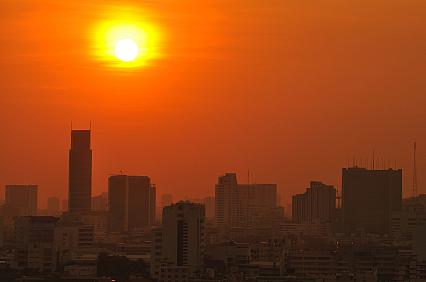The Long Hot Summer: Where is the Media Coverage of Extreme Heat's Impact on Health?

This week's news that July was the hottest month ever recorded in U.S. history left me wondering: why aren't we seeing more substantial coverage of the brutal heat's effect on people's health? This summer's relentless temperatures seem to echo Chicago's terrible heat wave of July 1995, which was linked to the deaths of nearly 750 people in a matter of days. Many were elderly and died alone.
Yet the media coverage I'm seeing these days emphasizes reader service stories (not that they're not important), stories about the heat's impact on young athletes, and sporadic reports on heat-related deaths.
Yes, a Wichita reporter offered a short broadcast on more heat-related cases in the city's emergency rooms (with no statistics). The Associated Press reported that Baltimore's heat-related deaths in 2012 already have surpassed last year's. The Chicago Tribune published perhaps the most comprehensive story to date on the heat's impact on health and the city's efforts to prevent heat-related illness.
But there's not nearly enough serious coverage like a recent New York Times story that examined a troubling number of heat-related deaths of inmates in Texas' un-air-conditioned prisons. (Tell me in the comments below if I missed an important story.)
Deaths from extreme heart, although small in number, were on the rise in 2011, according to the National Weather Service, and 2012's heat-related deaths could be even higher:
In 2011, 206 people died as a result of extreme heat, up significantly from 138 fatalities in 2010. This number is well above the 10-year average for heat related fatalities, 119. In 2011, the most dangerous place to be was in a permanent home, likely with little or no air conditioning, where a reported 119 deaths (58%) occurred. The next most dangerous identified locations were outside or in an open area, where 31 people (15%) succumbed to heat.
Here are some questions to ask in your community:
What's your community's plan for addressing residents' health during extreme heat? Are there enough cooling centers? Have budget cutbacks affected your community's ability to help vulnerable seniors and children?
What's happening in local emergency rooms? Are physicians seeing more heat-related illnesses?
What are local nursing homes and children's day care centers doing to keep their charges cool and safe?
What is your community doing to check on people before they die in their homes? What agencies are responsible?
It can be difficult to get statistics in real time: because the damaging effects of exposure to extreme heat are cumulative, it may not be immediately apparent that a death or illness is heat-related, particularly in people who have other health conditions.
Heat-related illnesses and deaths are not a reportable condition like tuberculosis or other infectious diseases; hospitals and public health agencies aren't required to monitor such deaths, although death certificates, which are public in some states, may note if the cause of death is heat-related. U.S. Census data can help you identify neighborhoods where vulnerable people, including seniors, are concentrated. The American Housing Survey, part of the U.S. Census, even tracks whether homes and apartment buildings have air conditioning.
Despite the challenges, it's critically important to investigate what's happening on the groundnow, not next summer when official statistics are released. Those weather reports aren't getting any better, and people's lives may be at stake.
As one Chicago emergency physician noted:
"For individuals who are not able to replenish by hydrating and resting, each day becomes more taxing. ... It's like driving a car without filling the gas tank — eventually you run out."
More Resources:
Dying Alone: An interview with Eric Klinenberg, author of "Heat Wave: A Social Autopsy of Disaster in Chicago", University of Chicago Press
Break from heat wave still a few days off: medical experts warn that scorching weather takes cumulative toll on body, Chicago Tribune
Health is Everything: Using Data to Report Great Stories on Your Community's Health: ReportingonHealth's e-book offers tips on using census data in your reporting
American Housing Survey, U.S. Census
2011 Heat-Related Fatalities, National Weather Service
Photo credit:

